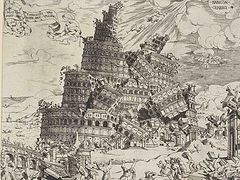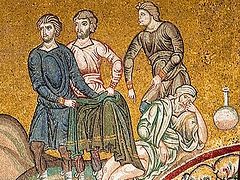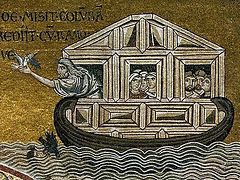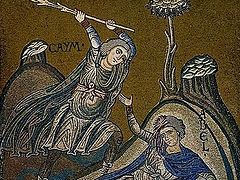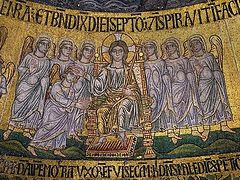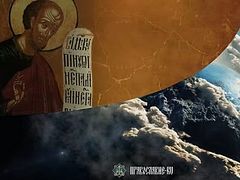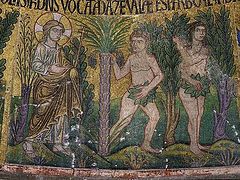Part 8. The Fall of Babylonian Civilization
In this next conversation on the Bible, Andrei Ivanovich Solodkov talks about the lessons in trusting God which we find in Genesis 12, on why Abram went into Egypt, and how to understand the fact that he gave his wife as his sister.
“By faith Abram obeyed”
In the previous talk, we spoke about why Babylonian civilization died: The Babylonians departed from God, and every departure from God, Who is Life, produces inevitable death. The renunciation of Life in that country led to savage paganism and idolatry. The English writer Chesterton said, “If a man stops believing in God, he begins to believe in anything.” And such a faith “in anything” leads to destruction—by your own desire. The people are scattered, civilization is destroyed—all these events are described in the first half of the eleventh chapter of the book of Genesis.
And later in the same chapter it says that among this perverse generation, fallen into occultism and astrology, which, in the words of Tertullian “is a type of magic,” lived Abram with his people, faithful to the One God. The arrogant and traitorous civilization of material prosperity crumbles, and Abram, as the patriarch, leads his people out of the stench and vileness of squalor. But a question arises: Why didn’t he lead his people out earlier, before the destruction of Babel? I think, that even though the people remained faithful to God, they clung with their hearts to earthly Babylonian prosperity and their faith became a formality. The patriarch saw the people’s unwillingness to leave, and prayed to God and awaited His call.
But let’s turn to Genesis chapter 12. We read:
Now the Lord had said unto Abram, Get thee out of thy country, and from thy kindred, and from thy father's house, unto a land that I will shew thee: And I will make of thee a great nation, and I will bless thee, and make thy name great; and thou shalt be a blessing: And I will bless them that bless thee, and curse him that curseth thee: and in thee shall all families of the earth be blessed.
So Abram departed, as the Lord had spoken unto him; and Lot went with him: and Abram was seventy and five years old when he departed out of Haran. And Abram took Sarai his wife, and Lot his brother's son, and all their substance that they had gathered, and the souls that they had gotten in Haran; and they went forth to go into the land of Canaan; and into the land of Canaan they came. And Abram passed through the land unto the place of Sichem, unto the plain of Moreh. And the Canaanite was then in the land.
And the Lord appeared unto Abram, and said, Unto thy seed will I give this land: and there builded he an altar unto the Lord, who appeared unto him. And he removed from thence unto a mountain on the east of Bethel, and pitched his tent, having Bethel on the west, and Hai on the east: and there he builded an altar unto the Lord, and called upon the name of the Lord.
And Abram journeyed, going on still toward the south (Gen. 12:1-9).
God calls Abram to leave the land where he was born, and his relatives, who, apparently, did not all heed his call and remained in Ur of the Chaldees. And so it is today: An Orthodox missionary, and even just a Christian, knocks on the door of the hearts of his relatives with a word on repentance and salvation, but they do not heed him and remain, to the bitter grief of the believer, in the world of passion and vice.
By faith Abraham, when he was called to go out into a place which he should after receive for an inheritance, obeyed (Heb. 11:8). Most of Abram’s kin did not remain deaf to his words, and went with him, but Abram’s father Terah did not leave Ur of the Chaldees (which is spoken about at the end of chapter 11) and died there.
God promises nothing to the chosen righteous one, except for descendants, but he follows the command of the Lord, being faithful to Him. The laws, histories, and images of faith spoken of in the Old Testament are given us for edification, and that we might emulate the righteous of God, and as a warning against the false path. Now all these things happened unto them for examples: and they are written for our admonition, upon whom the ends of the world are come, says the apostle (1 Cor. 10:11). As Blessed Theophylact of Bulgaria writes, “Because the believers among the Jews looked on him and the other patriarchs as having received innumerable blessings, then he intends to show that no one received anything (that is, Abram did not have so many examples and patterns for righteousness as we do.—A.S.). Therefore, it says that Abram obeyed by faith, receiving the command to leave his fatherland. For who did he know to emulate? His father was an idolater; he heard nothing of the prophets. Therefore, to obey God as telling the truth about what He promised, and to abandon that which he owned, was on his part a matter of faith.”
It was a matter of faith not only to hear God’s call, but also to do what was said: And he went out, not knowing whither he went (Heb. 11:8).
How can we know God’s will today without being mistaken? Move according to the law of faith, for Abram knew and loved Him Who told Him to so, and thus he believed Him, and knowing Him Who told him, he doubted not a single iota of what was said to him. Again I recall the words of the apostle Paul on the necessary conditions for knowing the will of God: And be not conformed to this world: but be ye transformed by the renewing of your mind, that ye may prove what is that good, and acceptable, and perfect, will of God (Rom. 12:2). To not accept the way of thinking, faith, and action of this age is the first step to knowing the will of God, which brings blessings and perfects faith and love for God and man. Man, created in the image and likeness, is imitative by his nature. The meaning of the word “likeness” here is to have an inclination to assimilate, to imitate, to be akin. According to the design of the Creator, man should have assimilated Him and gradually became a god by grace. But at the hinting of the devil, he decided to grasp at all the blessings and take possession of them quicker, as in a modern commercial: “Once and done.” We’ve already spoken of this in one of the preceding lectures, on “Why Does God Allow Evil?”
The image of this age is to possess temporary material goods, no matter what and no matter who with. But modern Orthodox people have to find images to emulate in faith not in commercials, fashionable magazines, and movies of questionable content, but in the Sacred Scripture and in the fathers of the Church, and in the liturgical tradition of the Church. Only then will the will of God be understandable to us—to that extent to which it’s useful for us. According to the measure of the strengthening of faith, according to the measure of our fulfilling the commandments of Christ—humility will appear, and according to the measure of humility, love will grow. Love is not consummative, not by the principle “take everything out of life; don’t let yourself wither up,” but love is sacrificial—according to the image of Christ’s sacrifice.
St. Ignatius (Brianchaninov) writes about it: “We must surrender ourselves to the guidance of faith. With this guidance in its time, after considerable ascetic feats of piety, God gives His faithful servant the mind of Truth, or a spiritual mind.”
“Faith,” notes the prelate of the Russian Church and land Tikhon of Zadonsk, “mysteriously unites the soul of the faithful with Christ, as a bride with her bridegroom; about which the prophet says on behalf of the Lord: I will even betroth thee unto me in faithfulness: and thou shalt know the Lord (Hos. 2:20). And the apostle echoes: For I have espoused you to one husband, that I may present you as a chaste virgin to Christ (2 Cor. 11:2). For the sake of this, Christ cleanses such a faithful soul from sin and every defilement and makes it holy, delivering it from every spiritual calamity—curses, condemnations, death, and every spiritual ill-being. Instead, He gives spiritual prosperity: blessing, deliverance, and eternal life. About this the apostle says that Christ was made unto us wisdom, and righteousness, and sanctification, and redemption (1 Cor. 1:30). He vests this faithful soul, having removed its tattered rags and having cleansed it from all impurity, in the pure crimson of His righteousness, that he would appear pure before His eyes and those of His Heavenly Father, as the king’s daughter, spiritually adorned in raiment of needlework (Ps. 44:15). And the holy prophet, spiritually rejoicing in this, exclaims, I will greatly rejoice in the Lord, my soul shall be joyful in my God; for he hath clothed me with the garments of salvation, he hath covered me with the robe of righteousness, as a bridegroom decketh himself with ornaments, and as a bride adorneth herself with her jewels (Is. 61:10).
Abraham possessed such faith. He knew Who was speaking to him. The sin of Babel and depravity could not damage his faith, because he firmly clung to God. And by this faith he did not fear to leave his kin, or his earthly fatherland, or his father’s house, although he had not heard the prophets. He was taught by God and believed that if He says something, it means it should not be forgotten or abandoned. Can a woman forget her sucking child, that she should not have compassion on the son of her womb? yea, they may forget, yet will I not forget thee (Is. 49:15).
Glory to God that He has cared for me, the unworthy!
As Noah, leaving the ark, built an altar to God and brought a sacrifice of thanksgiving for his salvation, so Abraham, having few images of Old Testament righteousness to emulate, leaving Ur of the Chaldees—leaving the world of passions and sin—brought a sacrifice. Sacrifice, as we have already said, is a prefiguration of prayer and thanksgiving. It would be good for us not to forget to thank God for who we were and who we have become, for bringing us out of some kind of quagmire of darkness and ignorance. The sacrifices of the Old Testament are a prefiguration of the main sacrifice of the New Testament—the holy Eucharist. The word “eucharist” means “thanksgiving.” Thus, the answer to the question of how often to commune is obvious—as St. Theophan the Recluse says: “As often as possible.” That is, run to the Sacrament of thanksgiving to God as often as possible!
Glory to God for all things. Glory to God that He created me in His image and likeness. Glory to God that He has redeemed me the fallen! Glory to God that He has cared for me the unworthy! Glory to God that he has called me the sinner to repentance! Glory to God that He has given me His holy word, as a lamp shining in a dark place (2 Pt. 1:19), and by it has guided me along the truth path! Glory to God that He has enlightened the eyes of my heart! Glory to God that He has given me to know His holy name! Glory to God that He has washed away my sins by the washing of Baptism! Glory to God that He has shown me the way to eternal blessedness! The way is Jesus Christ, the Son of God, Who says of Himself: I am the way, the truth, and the life (Jn. 14:6). Glory to God that He has not destroyed me the sinner, but in His goodness has endured my sins! Glory to God that He has shown me the delusion and vanity of this world! Glory to God that He has helped me in various temptations and has saved me in deadly situations! Glory to God that He has defended me from the enemy, the devil! Glory to God that He has raised me up from reclining! Glory to God that He has comforted me the sorrowful! Glory to God that He has converted me the deluded! Glory to God that He has chastised me like a father! Glory to God that He declared to me about His Dread Judgment that I might fear it and repent of all my sins! Glory to God that He has told me about eternal torment and eternal blessedness, that I might avoid torment and seek for bliss! Glory to God that He has given me the unworthy one food, which strengthens my feeble body; He has given me clothes, which cover my naked body; He has given me a home where I have found peace! Glory to God for His other blessings given for my protection and consolation! So many blessings I have received from Him; how many times I have sighed! Glory to God for all things!
exclaims St. Tikhon of Zadonsk!
Egyptian history: temptation, or trusting in God?
Let us return to the twelfth chapter of the book of Genesis. Let’s read:
And there was a famine in the land: and Abram went down into Egypt to sojourn there; for the famine was grievous in the land. And it came to pass, when he was come near to enter into Egypt, that he said unto Sarai his wife, Behold now, I know that thou art a fair woman to look upon: Therefore it shall come to pass, when the Egyptians shall see thee, that they shall say, This is his wife: and they will kill me, but they will save thee alive. Say, I pray thee, thou art my sister: that it may be well with me for thy sake; and my soul shall live because of thee (Gen. 12:10-13).
It’s interesting history, isn’t it? We only just admired the faith and piety of this righteous one, and suddenly Abram heads to Egypt because of a famine. And such a thought arises in us: “A righteous one, a man of faith—he could have fasted.” And the episode with Sarai exacerbates the situation. Abram said to his wife, “Say that you’re my sister.” Imagine how a modern, emancipated woman would have answered! “Who did I marry? Are you a husband or…” and such things. But Sarai, to our surprise, agreed. However, she really was Abram’s blood relative. Such marriages were allowed in antiquity, and they would bear healthy children, because man’s sinful nature, we can say, had not yet, accumulated so much corruption. Note that the status of a wife was higher at this time than the status of a sister. Sarai agreed all the same to say she was his sister.
We’ll sort all this out in order. Why did Abram decide to go to Egypt because of a famine? Remember that Abram is not a hermit, not a desert-dweller. He is a patriarch; he leads his people to Canaan—the prefiguration of the Kingdom of God. Had he been alone, perhaps he could have endured the famine, but he was responsible for people and did not want to put them in danger of starvation.
Abram’s descent into Egypt is a foreshadowing of Christ’s descent into hell. Egypt, in the Bible, is an image of hell. And that Abram could have been killed for his wife, but remained alive, points to the mystery of the death and resurrection of Christ: And after threescore and two weeks shall Messiah be cut off, but not for himself (Dan. 9:26). For Christ also hath once suffered for sins, the just for the unjust, that he might bring us to God, being put to death in the flesh, but quickened by the Spirit: By which also he went and preached unto the spirits in prison; Which sometime were disobedient, when once the longsuffering of God waited in the days of Noah, while the ark was a preparing, wherein few, that is, eight souls were saved by water. The like figure whereunto even baptism doth also now save us (not the putting away of the filth of the flesh, but the answer of a good conscience toward God,) by the resurrection of Jesus Christ (1 Pt. 3:18-21).
And now a few words on the situation with Sarai. We can say that Abram displayed a kind of cowardice, asking her to present herself as his sister. What kind of image do we, modern Christians, find here for emulation? I have already cited the words of the apostle Paul above: Now all these things happened unto them for examples: and they are written for our admonition (1 Cor. 10:11). But let’s read further—the twelfth verse—and find an answer that’s useful for us, for our salvation, that we can find in this Biblical story. They are very important words: Wherefore let him that thinketh he standeth take heed lest he fall (1 Cor. 10:12).
Abram’s act is a warning and edification for us. For if a man of such great faith doesn’t always act in the best way, then how can you dare to think so highly of yourself, to your own destruction? There’s a good response to Bible critics here. If in correspondences about the Bible, Churchmen had distorted the texts, as they say, then surely this spot would have been cleaned up. We disassembled the criticism of one of these “questionable” places in the Bible in our conversation on the creation of the world. First God creates the plants, and then the sun, and atheistic botanists are indignant: How can plants exist before the sun? What about photosynthesis?! And they advise: There are many distortions in the Bible, this should be corrected so it says the sun is created first, and then plants. No! Everything in the Bible is reliable, and Divine Revelation is accepted as is by believers. God created plants, and then the sun, so that we would understand that the beginning of life and life itself is given by God, and not the sun.
Thus, this “Egyptian history” is arranged by the providence of God. Blessed Augustine writes about it: “Now he did not deny that she was his wife, but held his peace about it, committing to God the defense of his wife’s chastity, and providing as a man against human wiles; because if he had not provided against the danger as much as he could, he would have been tempting God rather than trusting in Him.”1 In these events is seen a foreshadowing of the temptation of Christ in the desert. And we recall the words of the Savior, Thou shalt not tempt the Lord thy God (Mt. 4:7).
And we read further:
And it came to pass, that, when Abram was come into Egypt, the Egyptians beheld the woman that she was very fair. The princes also of Pharaoh saw her, and commended her before Pharaoh: and the woman was taken into Pharaoh's house (Gen. 12:14-15).
Analyzing this episode, the fathers of the Church turn to their attention to Sarai’s humility. There is not a word of reproach from her lips. She believes and loves her husband and is ready to sacrifice her honor that he might remain alive. And the Egyptians were truly so wanton so as to kill the husbands of beautiful women, and to take the latter into their harems. Sarai demonstrates sacrificial love and forbearance for her husband’s infirmities, for she knew of his wisdom, for she knew Whom he served. Although it will be for her a “fall,” she, as a weak person, shows confidence. But here is the love spoken of in the Gospel: Greater love hath no man than this, that a man lay down his life for his friends (Jn. 15:13); and Bear ye one another's burdens, and so fulfil the law of Christ (Gal. 6:2).
Sacred Scripture is not just a book of rules and laws, but a book of images, given to man for contemplation, that we would freely draw conclusions and decide how we ought to proceed in this or that situation and how not to. It is said, All scripture is given by inspiration of God, and is profitable for doctrine, for reproof, for correction, for instruction in righteousness: That the man of God may be perfect, thoroughly furnished unto all good works (2 Tim. 3:16-17).
Relying not on his own philosophizing, but on God’s will, this pious family left Egypt with honor:
And the Lord plagued Pharaoh and his house with great plagues because of Sarai Abram's wife. And Pharaoh called Abram and said, What is this that thou hast done unto me? why didst thou not tell me that she was thy wife? Why saidst thou, She is my sister? so I might have taken her to me to wife: now therefore behold thy wife, take her, and go thy way. And Pharaoh commanded his men concerning him: and they sent him away, and his wife, and all that he had (Gen. 12:17-20).
God strikes Pharaoh with severe blows for his lust for Sarai. Pagans then and now look at women only as objects for sexual gratification. But because Sarai obeyed her husband, she remained untouched by Pharaoh. St. John Chrysostom writes about this, “What imagination could adequately conceive amazement at these events? What tongue could manage to express this amazement? A woman dazzling in her beauty is closeted with an Egyptian partner, who is king and tyrant, of such frenzy and incontinent disposition, and yet she leaves his presence untouched, with her peerless chastity intact. Such, you see, God's providence always is, marvelous and surprising.”2
Recall here the words of the apostle Paul: For who hath known the mind of the Lord? or who hath been his counsellor? (Rm. 11:34). Recall what the Evangelist John writes in Revelation about those praising God in His Kingdom: Great and marvellous are thy works, Lord God Almighty; just and true are thy ways, thou King of saints (Rev. 15:3). The Kingdom of God will be inherited by those who fall, rise, and continue on.
***
In the following talks, we will consider those difficult situations which arose amongst the people of God—the Old Testament Israel—but by it we will be strengthened in faith, for remember: We know that all things work together for good to them that love God, to them who are the called according to his purpose (Rm. 8:28).



